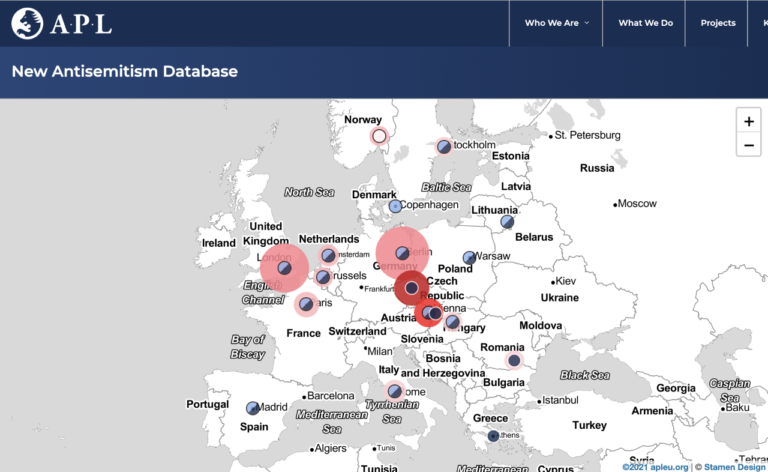Antisemitism takes many forms, both on the societal and the individual level. Certain forms of antisemitism are more common in some regions or settings and the way they are dealt with in legislation and society varies.
The International Holocaust Remembrance Alliance has published on its website a list of contemporary examples of antisemitism. APL agrees with IHRA’s approach and applies it in their monitoring activities. It is, however, important to emphasize that there are less obvious forms of antisemitism not mentioned on the list below. If you think that you or someone you know has suffered an antisemitic incident, even if not on the list, please contact APL for further guidance and support.
Antisemitic hate speech
Antisemitic hate speech covers all forms of expressions that spread, incite, promote or justify antisemitism. It includes public hate speech, hate speech channeled via the Internet and social media, any abusive behavior and abusive art.
Antisemitic discrimination
- Calling for, aiding, or justifying the killing or harming of Jews in the name of a radical ideology or an extremist view of religion.
- Making mendacious, dehumanizing, demonizing, or stereotypical allegations about Jews as such or the power of Jews as collective — such as, especially but not exclusively, the myth about a world Jewish conspiracy or of Jews controlling the media, economy, government or other societal institutions.
- Accusing Jews as a people of being responsible for real or imagined wrongdoing committed by a single Jewish person or group, or even for acts committed by non-Jews.
- Denying the fact, scope, mechanisms (e.g. gas chambers) or intentionality of the genocide of the Jewish people at the hands of National Socialist Germany and its supporters and accomplices during World War II (the Holocaust).
- Accusing the Jews as a people, or Israel as a state, of inventing or exaggerating the Holocaust.
- Accusing Jewish citizens of being more loyal to Israel, or to the alleged priorities of Jews worldwide, than to the interests of their own nations.
- Denying the Jewish people their right to self-determination, e.g., by claiming that the existence of a State of Israel is a racist endeavor.
- Applying double standards by requiring of it a behavior not expected or demanded of any other democratic nation.
- Using the symbols and images associated with classic antisemitism (e.g., claims of Jews killing Jesus or blood libel) to characterize Israel or Israelis
- Drawing comparisons of contemporary Israeli policy to that of the Nazis.
- Holding Jews collectively responsible for actions of the state of Israel.
Contact us for help to identify if an incident is antisemitic.








